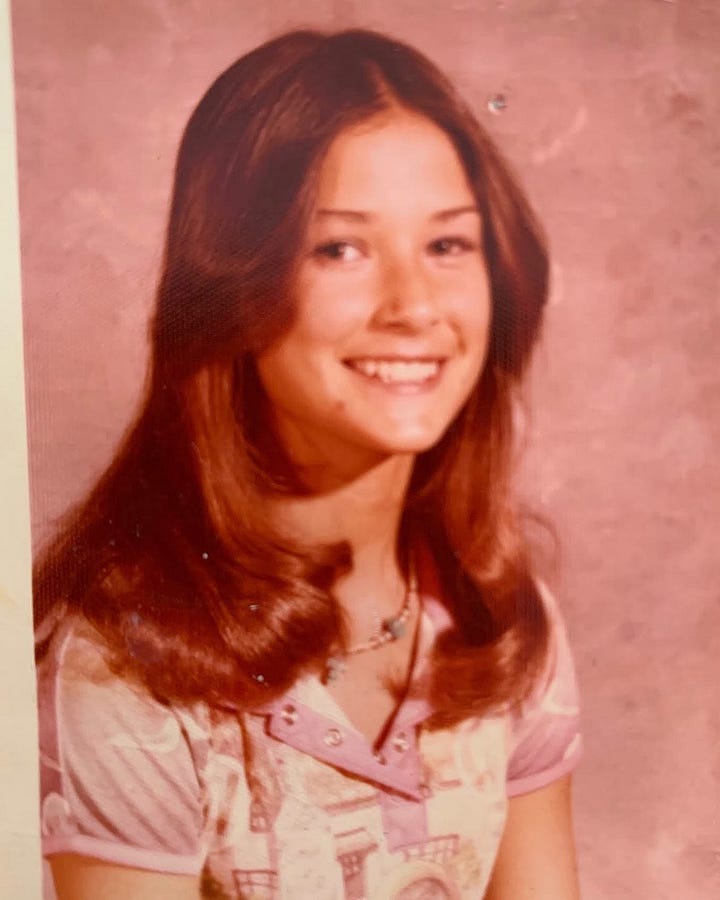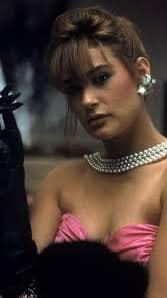From Charleroi to St. Elmo's— the remarkable transformation of Demi Moore and why she deserves Oscar gold
And why the Demi I knew during the making of the movie was the real Jules.


In the W story published shortly before she won her Golden Globe for Best Actress for The Substance, Demi Moore was kind enough to recall the story of how we met when I went chasing after her after she ran out of a John Hughes audition. As I recall it, I ran down a flight of stairs and across the backlot to catch her and ask her to come back and audition for the role of Jules in St. Elmo's Fire, the movie I had co-written with director Joel Schumacher. St. Elmo’s would be a break out film for Demi who would go one to even greater success with films like A Few Good Men and Ghost. The headline of that W piece talked about reinvention being Demi Moore’s “superpower.” As she stands poised to win an Oscar after her 47-year acting career, I am keenly aware of just what a transformative journey it has been.
When I first moved back to Pittsburgh, I was taking my car in for service when a mechanic, noticing my LA plates and hearing about my connection to the movie, informed me that Demi's step-father still owed him money. When I knew her during the making of St. Elmo's, I had a sense of the nomadic and turbulent childhood Demi had, but no idea she had spent time just outside of my own hometown of Pittsburgh. It was not until I read her memoir "Inside Out" that I realized that she had gone to seventh grade at Charleroi High School and had, like myself, struggled to fit in. As Demi recalled it, by then, she had already learned how to "act" like the new kid and try to win over friends. She was born Demetria Gene Guynes and would change her name after a short-lived marriage when she was still a teenager to musician Freddy Moore. But after incredible determination, it seems like she has now become fully herself and become as her character Jules might say, the fabulous person is today. .
I still can picture the Demi who I ran after that day on the lot at Universal Studios, her raven hair flowing, wearing a motorcycle jacket and possibly carrying a helmet. Joel Schumacher had an office next to John Hughes, and I recall us both saying some version of “that’s her.” I don't know what it was exactly that made Joel think she would be the perfect "Jules," but for me, she bared a striking resemblance to the person we had based the character Jules on. At the time we were writing the script, i was living in an anarchist collective in Hollywood and Jules was my wild-child Holly Golightly-like housemate who had the same dark hair, raspy voice, and free-spirited, infectious gusto for life that in the movie Demi would inhabit so perfectly.
I saw Demi again while we were still casting in a bar called Ports where I was set up on a blind date with a "hot girl" from Cleveland who clearly thought my nerdy self was beneath her. But on the way to the restroom, Demi called me over and we ended up talking for ten minutes as I had trouble escaping her spell. It was probably not surprising that when I finally went back to my understandably peeved date, she immediately had me take her home.
Demi had that star charisma which was quite evident. Rob Lowe had flown in one weekend while making Youngblood to meet with Joel about the role of the bad boy Billy, and when came in Monday, Joel had told me how Demi had somehow appeared in his office and and the chemistry was so strong between them, they left and went to Spago, and after that, well, you can see their movie "About Last Night" for what Joel implied had happened.
I was there at Demi's screen test, and though we had seen a lot of actresses, it seemed clear to Joel, casting director Marci Liroff, and producer Lauren Shuler Donner that Demi was the one. Joel called executive Craig Baumgarten to tell him he was casting Demi, and Craig said how he loved that choice. Though Demi had played Jackie Templeton on “General Hospital,” and made a splash in the movies "Blame It on Rio" and "No Small Affair" where she was a wild singer and nerdy Jon Cryer was infatuated with her, there was a sense that this part and this movie could take Demi’s career to the next level.
Then less than two weeks before we were to shoot, Joel got a call from our costume designer Susan Becker that Demi had shown up drunk and high for a 9 a.m. for a costume fitting. Having gone from being a star in New York’s fashion industry to a drug addict in his own twenties, Joel told me he told Demi to "go kill yourself on someone else's movie." Realizing how much was at stake, he and Lauren gave Demi an ultimatum that she had go to rehab and get clean or she was off the movie. As we waited, Joel confided he was considering replacing her with Jenny Wright, the actress playing Billy’s long suffering wife, or this new singer he had met— Madonna.
To her great credit, Demi got clean in record time and I vividly recall Demi showing up on that soundstage that Warner Brothers shared with Columbia for the table read with the rest of the cast. She was with her sober companion Chris, and the whole room seemed to be rooting for Demi who was obviously in a vulnerable place. But I remember Joel quietly saying that based on her grit and drive, he believed Demi might have the biggest career out of all of our very talented cast. At least once, I remember going with Demi to an AA meeting, though I can't recall whether this was Joel's suggestion or hers. But I got a sense then how Demi was not just working a program, but guiding herself along a more spiritual path.
My memories of Demi during the production were mostly tame compared to the frenetic out-of-control character she was playing. She had started dating Emilio Estevez and they seemed gentle with each other. When we went to the Hard Rock, Demi stayed away from the booze, and I most distinctly remember being over at the cute bungalow she had bought in West Hollywood. Before St. Elmo's, Demi had success as an actress, pBut St. Elmo's seemed to bring Demi a new life even before the movie was finished. And I remember her commenting on how for the first time, having that house, she felt she had a home.
I was always a little nervous talking to actors, and we didn't talk much about the traumatic past she would reveal in her memoir. But then came the time for Demi to play her most emotional moment in St. Elmo’s. It was the breakdown scene where Jules has lost everything—her job, her Black Jeep, her furniture. Jules' friends were to find her in her empty apartment dressed only in a t-shirt trying to melodramtically freeze herself to death. Demi found out that the scene was based on something that I had done in college after a girl broke my heart. Of course, stripping down to my boxers and opening the windows so she would find me prone on the floor was less a suicide attempt than a cry for attention as I was going to school in tepid North Carolina. Demi realized what a raw moment this was for her character, and asked if it would not have been more powerful if Jules was naked. I understood where Demi was coming from artistically, but suggested if her friends came and found her naked, it might be a distraction. (Of course, it is ironic that she was sans clothes for so much of "The Substance" for which she is nominated.)
After St. Elmo's wrapped, I went and visited Demi while she and Emilio were filming "Wisdom," a "Badlands"-esque movie Emilio had written and was directing. I spent time with Demi in her trailer where she was reading something that had to do with prophecies and even then it seemed like she was connecting to some larger destiny.
The next few months were rocky as I got an invitation to Demi and Emilio's wedding and then an announcement that the wedding had been postponed. I next saw Demi at Emilio's 25th birthday party at Ed Debevick's that Tom Cruise had thrown for Emilio. Demi was not expected and Emilio was there with Susannah Hoffs of The Bangles. (Oh, the 80s.) As a joke, someone had come with a blowup doll dressed like Demi, and then like in a movie, she walked in. She had started seeing her new boyfriend Bruce Willis, but wanted to say hi to Emilio. They sat in a booth and spoke to each other and you could tell there was still real affection between them.
This was all a lot for someone not yet twenty-five. A couple of years I would end up going to Demi and Bruce's wedding on the backlot of Twentieth Century Fox. Though that was more like a movie production. My wife Natalie and I sat at the table with Little Richard who had performed the ceremony. I still have the rubber duck centerpiece which says Bruce and Demi.
Though it's been years since Demi and I have spoken, I still feel connected with her, like someone you went to college with—which is probably appropriate since St. Elmo's Fire was basically the "college" of all those actors—none of whom actually graduated as they were too busy working. Last summer, some of the gang was reunited for Andrew McCarthy's "Brats" documentary, and Marci Liroff who was part of the Q&A told me Demi had asked about me. I blushed, like that college freshman who can't believe the popular girl even knew who I was. You could sense in that documentary when Demi talked to Andrew, that she has a wisdom about the universe that has been hard won. What has been so impressive about Demi's comeback is that it really feels like she has come home to the true self she has finally gotten to be. When Demi spoke when she won the Golden Globe for Best Actress she inspired millions by reminding us how you don't have to be who they thought you were back in high school. She has come a long way from Charleroi.




What a story, Carl! You are ever the great storyteller.